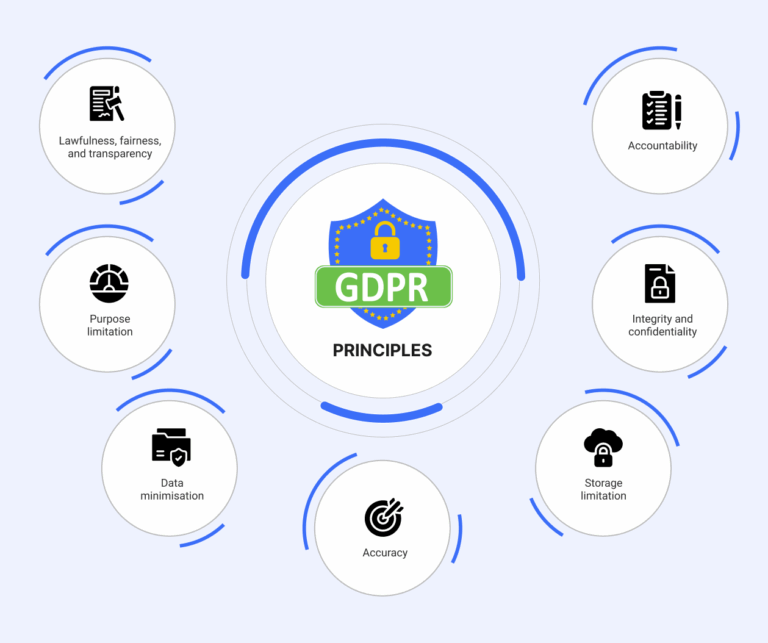When was the last time your staff received GDPR training? Many businesses invest heavily in security systems, policies, and compliance frameworks, but overlook the simplest and most effective safeguard: employee awareness. Staff handle personal data every day, from responding to emails to processing customer orders, and without proper training, they remain the weakest link in data protection.
Recent reports highlight that human error remains the leading cause of data breaches in the UK and EU. In fact, the UK Information Commissioner’s Office (ICO) regularly cites misdirected emails, poor password practices, and mishandled records as common compliance failures. These incidents could be reduced significantly if staff were properly trained.
This blog explores what GDPR staff training is, why it matters, the key areas it should cover, and how businesses can get started. By the end, you will see why staff training is not optional but a core compliance requirement. Read on!
GDPR staff training educates employees on handling personal data responsibly in line with the General Data Protection Regulation. It does not focus on memorising legal text but translates compliance into everyday practices. Staff learn to identify personal data, protect it appropriately, and respond correctly when issues arise.
Every employee who interacts with personal data needs training. This includes customer service teams, sales representatives, HR departments, IT staff, and marketing professionals. Since nearly every business role touches personal data, GDPR training ensures that compliance is a company-wide responsibility, not confined to the data protection officer.
GDPR requires businesses to implement “appropriate organisational measures” to protect personal data. Training is one of these measures and is often cited by regulators as evidence of accountability. In enforcement cases, companies with structured training programs are better positioned to defend themselves than those without.
The ICO and the European Data Protection Board (EDPB) report that most data breaches are not caused by hackers but by everyday mistakes. Staff who send sensitive information to the wrong recipient, fall for phishing emails, or mishandle paper files can trigger significant fines and reputational damage. Regular training equips staff to recognise risks and act responsibly.
Surveys show that 81% of consumers in the UK and EU are concerned about how companies use their personal data. A well-trained workforce reduces compliance failures and demonstrates to customers that data protection is taken seriously. Protecting trust directly supports long-term business growth.
Staff must first understand what personal data actually includes. It extends beyond names and emails to phone numbers, addresses, IP addresses, employee records, customer preferences, photographs, and identification numbers. Training helps employees recognise data that requires protection so they can handle it responsibly.
Training introduces staff to GDPR’s seven basic principles:

Good practice is about consistent behaviour. Staff must learn to lock their screens, use strong passwords, avoid unsecured devices, and report mistakes immediately. Encouraging proactive risk reporting creates a safer environment for handling personal information.
Different teams face different risks:
Tailored training makes staff engagement higher and learning more relevant to daily responsibilities.
Training demonstrates to regulators that your organisation actively prioritises GDPR compliance. In the event of an investigation, records of staff training may help reduce fines by proving due diligence.
Trained employees handle data requests, security incidents, and day-to-day tasks with greater confidence. They save time, reduce errors, and avoid confusion when sensitive situations arise.
A consistent training program builds a culture where employees see data protection as part of their role. This cultural shift strengthens compliance across departments and reduces long-term risks
Launching GDPR training does not have to be complex. Follow these steps:
These steps create a structured, effective program without overwhelming staff.
Training must be continuous, not one-off. Laws and regulations are updated regularly, so training content and key points should be reviewed and refreshed accordingly.
Best practice is to:
This ensures staff stay informed and engaged with the latest compliance requirements.
GDPR staff training is no longer optional; it is a vital organisational measure. Businesses that neglect training expose themselves to higher risks, greater regulatory scrutiny, and potential reputational damage. On the other hand, companies that invest in staff training protect personal data more effectively, build customer trust, and strengthen their compliance posture.
For businesses aiming to reduce risk while enhancing their reputation, GDPR staff training is the logical starting point. Equip your teams with the knowledge to act responsibly, and your business will not only meet compliance obligations but also gain a competitive edge.
Seers Ai provide GDPR training to help your employees understand personal data and how to manage it correctly. Learn key principles like minimise, anonymise, secure, and delete in a 30–45 minute online session. Complete with assessment and certification to ensure your team is compliant, confident, and ready to protect your business.
Failure to provide GDPR staff training can lead to serious compliance gaps. Without awareness, employees may mishandle personal data, increasing risks of breaches, fines, and reputational harm. Regulators expect organisations to prove staff are trained as part of “appropriate organisational measures.” Lack of training makes it harder to demonstrate accountability, leaving businesses exposed during investigations or audits.
Most GDPR staff training sessions are designed to be practical and time-efficient. A basic awareness course can be completed in 30–60 minutes, with additional role-specific modules available if needed. Refresher training is typically shorter, often delivered online in bite-sized updates. The goal is to provide clear, actionable guidance without overwhelming staff, ensuring learning fits seamlessly into daily workflows.
Yes, GDPR training should be provided to all employees who handle or access personal data. This includes HR, marketing, sales, IT, and customer support staff. Even employees with indirect access, such as contractors or temporary workers, may require training. The principle is simple: if someone processes personal data, they must understand their responsibilities under GDPR to prevent accidental breaches and ensure compliance.
GDPR training is not a one-time exercise. Best practice is to refresh training annually, during staff onboarding, and whenever laws or company policies change. Regulatory guidance and case law evolve regularly, so training content should reflect the latest requirements. Ongoing updates help ensure staff retain knowledge, adapt to new risks, and maintain a proactive culture of data protection across the organisation.
Effective GDPR training should lead to several outcomes: improved understanding of what constitutes personal data, reduced human error, stronger compliance culture, and better response to data subject requests. Staff should feel confident in identifying risks, applying the principles of minimise, anonymise, secure, and delete, and knowing when to escalate issues. These outcomes collectively reduce regulatory exposure and protect customer trust.
Yes, GDPR staff training directly reduces the likelihood of data breaches. Research shows most incidents result from human error, such as misdirected emails or weak passwords, rather than external attacks. Training equips staff with practical habits like reporting mistakes quickly, safeguarding sensitive files, and recognising phishing attempts. By raising awareness and building confidence, training helps transform employees from weak points into a strong first line of defence.


United Kingdom
24 Holborn Viaduct
London, EC1A 2BN
Get our monthly newsletter with insightful blogs and industry news
By clicking “Subcribe” I agree Terms and Conditions

Seers Group © 2026 All Rights Reserved
Terms of use | Privacy policy | Cookie Policy | Sitemap | Do Not Sell or Share My Personal Information.